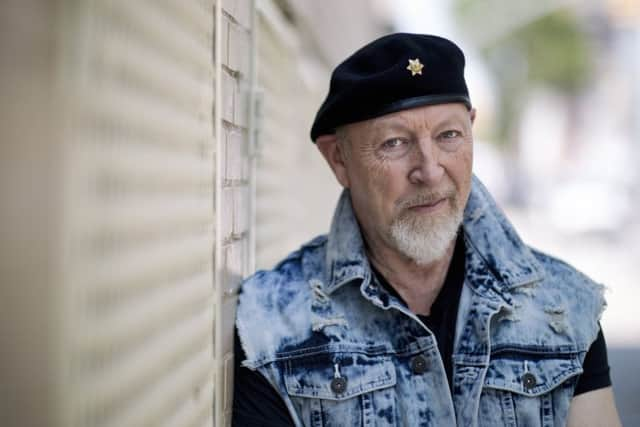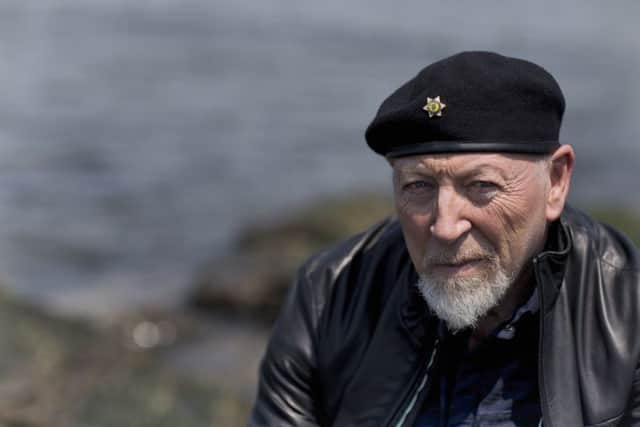Music interview '“ Richard Thompson: '˜I sort of like grey and bleak'


As a professional musician for more than 50 years, you might think few things would disarm folk rock guitar legend Richard Thompson.
Yet in the notes for his powerful new solo album, 13 Rivers, the 69-year-old describes the songs as ‘a surprise in a dark time’.
Advertisement
Hide AdAdvertisement
Hide Ad“I often get the feeling that the songs find you rather than you find them,” he elaborates today. “I think as a creative person, you put the effort in and you take the frustration of trying and failing to write songs, and then it’s almost as if when you’ve given up or you’re beating your head against a wall that something comes to you. It’s all very mysterious.


“Songs often arrive and you think ‘that’s a really weird song’ or ‘I can’t think why I’d write a song like that’. I wouldn’t set out to write a song like that, but here’s this song and it obviously reflects my own emotions, but it’s almost like a parallel world, it’s not my life and it’s not quite fiction, it’s somewhere in the cracks. It’s very strange. There’s something subconscious going on there – or I just need therapy, perhaps.”
By Thompson’s own admission, 13 Rivers begins with some of his most “idiosyncratic” songs that throw the gauntlet down to listeners. “I thought I’d rather people heard those and thought ‘OK, this is something a little bit different’ than I put the most accessible stuff at the front and people said ‘It’s the same old stuff he’s been doing for the last 50 years’, that was the thinking behind it,” he explains.
“I thought I’d throw the more quirky ideas the front of the record and if people can manage to get through that then they’ll get through anything.”
Advertisement
Hide AdAdvertisement
Hide AdThe album was cut at Boulevard Recording Studios in Los Angeles, the city where Thompson has had a base for more than 35 years. Once owned by Liberace, the studio was popular in the 70s with the likes of Steely Dan and Fleetwood Mac. Thompson says he doesn’t “really care” for a place’s history; the more important thing was it sounded good.
“It looks really tatty, the paint’s peeling off the walls, it was last decorated in about 1957 but it sounds great,” he says. “I’d rather a studio spent the money on equipment than decor. I think because it’s a bit run-down it’s a bit cheaper compared to other studios in the same town.
“I love the engineer there [Clay Blair], we had a good working relationship, so for me it’s a really good place to record.”
Thompson might have been playing for more than five decades yet he still finds his ears open to different styles of music. “I try to be open to styles and also to eras of music – I think there’s so much you can learn from looking backwards, certainly through recorded music history but even before that,” he says. “There’s wonderful ideas and forms within music that often get overlooked by the passage of time.
Advertisement
Hide AdAdvertisement
Hide Ad“It’s good to hear what people are innovating right now – or not. I get very jaded with the kind of sound of modern pop music, it has a very narrow texture, but I think as a musician you have to keep your ears open, you have to be open-minded to the possibilities.”
Songwriting through the ages has long interested Thompson. In recent years he has toured a show called 1,000 Years of Popular Music, in which he delved back as far as the 11th century and concluded with Britney Spears’ Oops I Did It Again. “Researching for that show was really interesting,” he says. “I found lots of inspiration from going through archives and in some cases other people’s recordings of early music. It was really educational and I thought there’s so many nice ideas here that have been forgotten, so it was great.”
Thompson began playing guitar when he was 10 years old, inspired, he says, by “hearing early rock ’n’ roll and seeing Elvis and Gene Vincent and Eddie Cochran and Buddy Holly, all standing with guitars – it seemed absolutely the sexiest thing”. He also credits the influence of skiffle, “this whole idea of a do-it-yourself music where all it needs is a guitar or two and a washboard and a tea chest bass and you too can make music – that was a really early inspiration for me from about ’55, Lonnie Donegan stuff, the guitar just seemed a must-have”.
At the age of 16 he helped form the band, Fairport Convention, who married traditional English folk music with the spirit of rock ’n’ roll. He says they were trying to connect with something “deeper and different” to contemporary music in the late 1960s. “I think we got frustrated with sourcing our music from North America,” he explains. “First of all we loved rock ’n’ roll and we loved jazz, all those American classic music forms, but at a certain point we thought ‘We’re being very second-hand here, we’re learning our music from records. We don’t live in Chicago, Memphis or New Orleans. We love the music but it’s not really us, but perhaps if we played something that had a bit more of an indigenous base and we blended that with rock’n’roll then it would be something original, it would speak more for us and for the audience.’ So that was the idea that Fairport had and it was partially successful anyway.”
Advertisement
Hide AdAdvertisement
Hide AdThompson left the band after their sixth album, Angel Delight, in 1971 and spent “a year or two” being a session musician – “I played in Sandy Denny’s band, I played in Iain Matthews’ band” – before making his first solo record, Henry The Human Fly in 1972. It was, he says, “a statement of intention of the kind of music I wanted to play”, but he insists he “typically wasn’t really thinking of anything beyond that”.
Forming a duo with his then-wife Linda the following year “just seemed the logical thing to do”. “We were both performing in different bands at the time and we never saw each other so we thought if we performed together then we’d be able to spend some time together, so that was where that started.”
In the mid-1970s Thompson discovered the Sufi Islamic sect and he remains a committed Muslim today. “I think it’s very important to have a spiritual dimension,” he says. “It’s important as you get through life to ask the big questions. I think I’ve always been a spiritual person, certainly from when I was a young teenager and that’s something that has stayed with me and I think in a subtle way that gets reflected in the music.”
Although he has lived in California since the 1980s, Thompson has retained a deeply English songwriting sensibility – specifically centred on his London upbringing in the 50s and 60s. “I think there is an inner landscape that you carry around with you,” he says. “It was possible for James Joyce to live in Paris or Zurich and write vividly about the Dublin of his youth. I think that also translates to other art forms and lesser artists.
Advertisement
Hide AdAdvertisement
Hide Ad“I can’t imagine setting a song in Los Angeles, that doesn’t fit for me somehow, but I can write a song sitting on the beach in the sunshine in California or Monte Carlo or wherever. I don’t think that matters. I think that you have images in your head, and I have a lot of images of a very black-and-white Britain when I was a kid. It’s usually grey and it’s fairly bleak, but I sort of like grey and bleak. It’s a terrible thing to say, but I do.
“But also there’s these historical connections. I think of quite historical London – Dickens and medieval London. There’s a resonance that goes into an old city and in a song set in a town like London you take on some of that history.”
Last year Thompson helped Fairport Convention celebrate their 50th anniversary at Cropredy festival. They are a band that still feels close to his heart, he says. “Someone suggested it’s a band you never leave, it’s a one-way door,” he chuckles. “It was always a friendly band. We were friends, we were neighbours, that’s how the band started and when people came into the band they felt welcome and if you leave the band they’re still your friends.
“It’s a strange thing, but I have a lot of love for the people in the band and I still relate quite closely to the style of music. It’s in danger of being an institution, it’s been around that long. Perhaps it’ll go on beyond my lifetime.”
13 Rivers is out now. Richard Thompson plays at Leeds Irish Centre on October 12, York Grand Opera House on October 22 and Hull City Hall on October 23. www.richardthompson-music.com